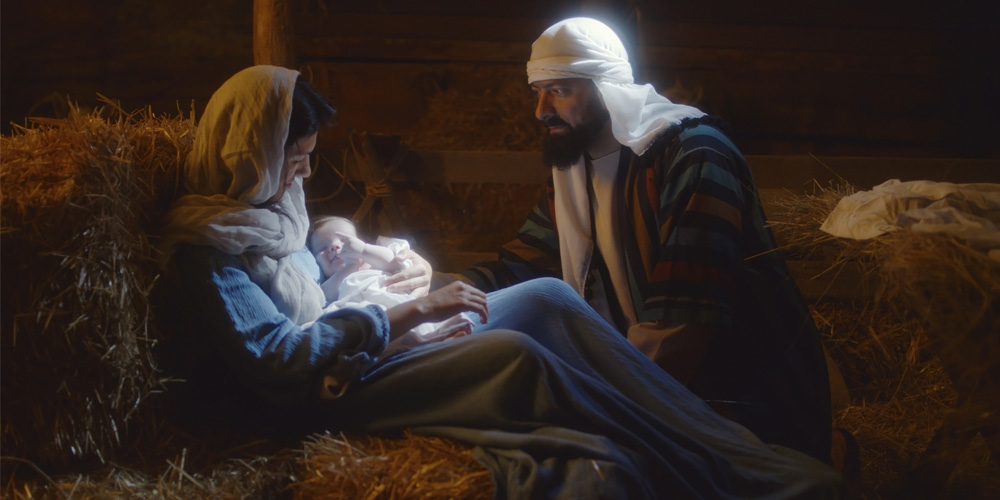Welcome to Adventist Review’s Retro Christmas In this short series over the holidays, we’ll be bringing you Christmas articles from years past. Why […]

Welcome to Adventist Review’s Retro Christmas
In this short series over the holidays, we’ll be bringing you Christmas articles from years past. Why explore vintage Adventist Review? Because the reason for the season never changes. So sit back and join us as we revisit Christmas from the pages of Adventist Review. Perhaps what you read and hear will be nothing new, or maybe, just maybe, these thoughts on the miracle of the Savior coming to us as a baby will ignite or reignite something beautiful in your heart. From our Adventist Review Ministries family to yours, blessings for a beautiful Christmas season.—Enno Müller, news editor
A little boy, the child of missionaries, was attending school in the United States. At Christmas the principal visited his room and asked him, “Son, what would you like to have most of all for Christmas?”
The boy looked at the picture of his father framed on his desk and said, “I want my father to step out of that frame.”
This little boy voiced the same kind of hope that Adam and Eve did after they had been driven from their Eden home. They longed for and began to look for the promised Saviour. They hoped that their firstborn son would be the Redeemer; but he was not.
In the years that followed, generation after generation looked for the Messiah. Finally, God did step out of eternity. He came as Emmanuel, God with us. Soon after Christ was born the angelic choir sang, “Glory to God in the highest, and on earth peace, good will toward men” (Luke 2:14).
The angelic song broke forth in glorious peals of music that heaven’s gates could no longer bar. It was a song of joy such as earth had not heard since the “morning stars sang together, and all the sons of God shouted for joy” (Job 38:7). “Glory to God in the highest,” the angels caroled. The heavenly music rolled downward as they celebrated God’s greatest gift. In Bethlehem’s manger was cradled One who would bring peace on earth and good will among humans—if humanity would respond.
In the gift of Jesus, God gave all. Everything that Heaven possessed was wrapped up in the Infant lying in Bethlehem’s manger. To bestow this greatest of all gifts, God emptied the storehouse on high and depleted the resources of heaven. God could give nothing better; He could give no more. He gave Himself.
There was no selfishness in the gift of Jesus. We humans may give gifts occasionally because we are selfish and proud. The Pharisees of old dropped their tinkling coins into the temple treasury to satisfy their egos by eliciting admiration and praise from onlookers. There is danger that you and I at times may perform good deeds and give gifts to be seen and admired by others. But God’s gift on that first Christmas night was not packaged in the wrappings of selfishness. It was gift-wrapped in love and complete self-renunciation.
It is hard for us to grasp what God’s Christmas gift really did cost our heavenly Father. Abraham partly understood the cost when he was about to offer Isaac on Mount Moriah. A father and mother who, during the Vietnam war, lost their only son on the battlefield — a fine-looking, outstanding youth in whom all their hopes centered and without whom life was empty and meaningless — began to fathom what the gift placed in Bethlehem’s manger meant to God. But these parents did not volunteer to send their only son to suffer and finally die a cruel death in the jungles of Vietnam. They let him go only because their country demanded it.
However, God volunteered to give His great and good gift. “God so loved the world, that he gave his only begotten Son” (John 3:16). The gift presented to the world at Bethlehem expressed as nothing else could God’s unfathomable love toward you and me. Struck by this matchless gift, the angelic choir poured forth rapturous praise to the Creator.
Selfishness originally all but ruined God’s perfect creation. Lucifer, the light bearer and son of the morning, was too selfish to accord first place in the universe to the Son of God. It was selfishness that made Eve more concerned about gratifying her appetite than obeying the will of her Creator. Selfishness made both Lucifer and Eve more eager to become equal with God in wisdom than to trust His will for them. It was selfishness that prompted Adam to eat of the forbidden fruit, since he could not endure the thought of forfeiting Eve’s companionship. Because his vision was obscured by the demands of selfishness, he failed to recognize that the Creator, who had given him Eve as a companion in the beginning, could provide another helpmeet should Eve be separated from him.
Selfishness Demanded Jesus’ Life
Selfishness has over and over again demanded the sacrifice of human life. It was selfishness in human hearts—in your heart and mine—that demanded the life of Jesus!
Selfishness prompted Moses, before he was converted, to campaign for the position of leadership in Israel. With a high opinion of himself, he came out of Pharaoh’s palace to urge his candidacy. To achieve this goal he committed murder. Forty years later, when God called him to lead, he was loath to respond and would have preferred that the responsibility be given to someone else.
It was selfishness on the part of the 12 apostles that led them to campaign and strive for the highest position in Christ’s coming kingdom. But before the outpouring of the Holy Spirit on the day of Pentecost they had been freed from that selfishness. As a result, there was no campaigning for position or office in the upper room.
There was and is no selfishness in Jesus. Every time I think of Jesus’ sacrifice for us, the more strange it seems to me. In heaven Jesus had been the ruler of the heavenly host. The angels had delighted to perform His every bidding. But this member of the Godhead, whom the angels adored, volunteered to leave His glory. He renounced His exalted position, came down to this earth, clothed Himself with humanity, and took upon Himself the form of a servant (Philippians 2:5-8). As a man, the Son of God was looked upon as an ignoramus; the educated of His day laughed and sneered at Him; He was reviled as a base criminal; and finally was crucified cruelly on Calvary’s cross by the people He had come to save.
Why did Jesus volunteer to expose Himself in this way when He knew before He came to this earth what suffering and humiliation the plan of salvation would bring Him? He chose to do so because there was no selfishness or self-seeking in Him — nothing but unfathomable love for sinners. Although Jesus occupied the highest position in the universe, He did not look upon this as a thing to be grasped at or tenaciously held onto. Instead, He voluntarily relinquished His exalted position and stepped down that He might lift us from the depths of sin and make us partakers of His glory.
This Christmas season, as we consider anew this gift that came wrapped in swaddling clothes in Bethlehem’s manger, we need to ask ourselves whether we have permitted Jesus to free us from selfishness. Jesus came to set us free from stifling selfishness and self-seeking. In the words of the emancipation proclamation contained in His maiden sermon at Nazareth: “The Spirit of the Lord is upon me, because he bath anointed me to preach the gospel to the poor; he hath sent me to heal the brokenhearted, to preach deliverance to the captives, and recovering of sight to the blind, to set at liberty them that are bruised” (Luke 4:18).
What Do We Do?
To whom do we give gifts at Christmas? Do we give them only to those from whom we expect to receive gifts in return? What do we do for, or give to, Jesus at Christmas? What would you think of a birthday party where everyone gets a gift except the person in whose honor the party is being held? Do we not often do that with Jesus at Christmas?
We do not seem to forget the traditional occasion of His birth — Christmas — but amid all the festivity of the Christmas season we do sometimes seem to forget the Person in whom the entire Christmas season centers.
It is only when we accept God’s Christmas gift fully — when we personally and individually allow Him to live out His life within us — that our selfishness will disappear and that He can make us partakers of His divine nature. Peter assures us that through the Lord’s exceeding great and precious promises we “might be partakers of the divine nature, having escaped the corruption that is in the world through lust” (2 Peter 1:4). What wonderful assurance!
In one respect we have learned our grammar too well. It is difficult for us to forget that the first person is “I.” To Jesus the first person was not “I” — instead it was the person who was in greatest need — it was you and I, people who had fallen into sin and were irretrievably lost until He saved us.
Sometimes there are beautiful illustrations of self-forgetfulness manifested in large families. Parents with many children seem to forget themselves. They always seem to be thinking of their children. The father and mother in such families come to the place where they no longer seem to have any thought for self. If you ask them what they need or can use they reply that they need nothing. But they themselves are constantly conscious and aware of the wishes and needs of their children.
This Christmas season, and in the days that follow, the Christ of Bethlehem wants us to learn to forget self and to care instead for the needs of others; He wants us to learn of Him and be filled with good will toward those in need. As we are thus filled with good will toward others, we shall do all we can to bring peace to their troubled and anxious hearts, thus helping to bring peace to earth.
An army chaplain in World War II relates an experience that took place as he was moving into Germany with the United States Army in 1944. As Christmas approached, he found himself with his unit in a small town in western Germany. The civilians in the town were bewildered and afraid, particularly as part of the conquering American army moved in. But Americans are friendly, and so are American soldiers. They could not think of Christmas among people who feared and dreaded them. So on Christmas Eve they went caroling, singing “Silent Night, Holy Night.” Even though the boys and girls and the men and women could not understand all the words, they recognized the tune. As they heard that Christmas carol, they were no longer afraid. They became approachable and friendly. The good will in the hearts of the American soldiers toward these frightened strangers brought peace into the people’s hearts.
“Blessed are the peacemakers: for they shall be called the children of God” (Matthew 5:9). As the angels of heaven see those of us who were once “the children of wrath” (Ephesians 2:3) transformed into peacemakers, their glorious hallelujahs will once again fill the Christmas sky.
This article originally appeared in Adventist Review on December 18, 1980.








